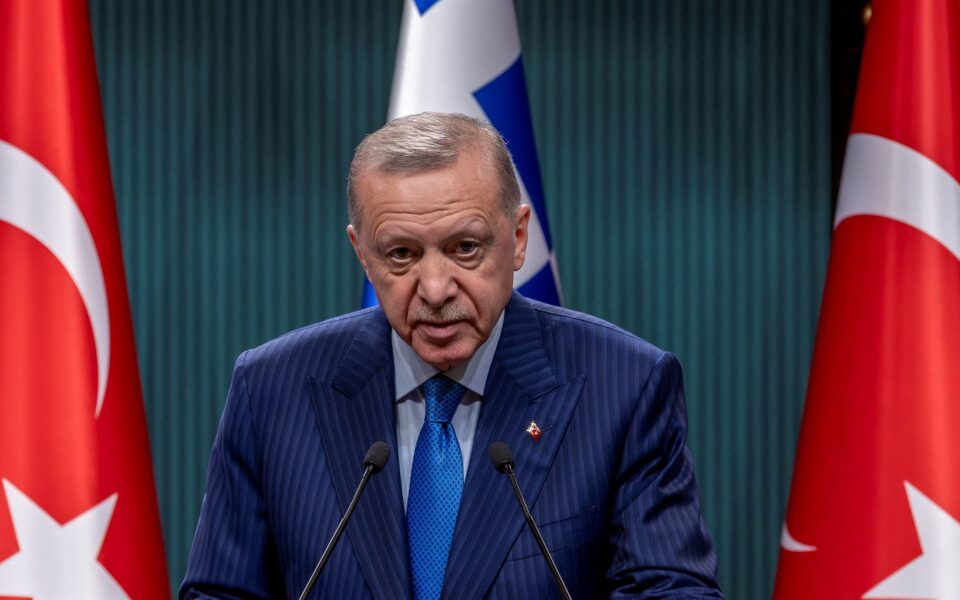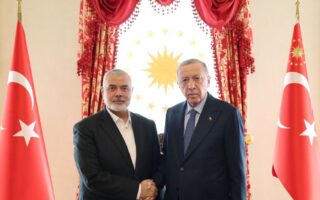Erdogan’s Turkey: Champion of Hamas, and an adversary of the West

Press conferences convened by heads of government, are usually carefully planned and choreographed occasions. Typically, prior to taking the podium, each leader’s staff usually finesse their agreed-upon statements and decide whether to field questions from the gathered press pool. In a perfect world, this should not be a forum where surprises are sprung upon one leader by the other.
This was not the case at a meeting between Greek Prime Minister Kyriakos Mitsotakis and Turkish President Recep Tayyip Erdogan on May 13. It is a well-established fact that Turkey and Greece disagree on many foreign policy issues, ranging from maritime border and airspace disputes, all the way to how to settle the Cyprus dispute. While these issues are difficult to resolve, summits between Greek and Turkish leaders have not been occasions where these differences act out. Leaders are usually cordial and respectful towards the other. A new issue where Turkey and Greece (and most of the Western Hemisphere for that matter!) hold opposing views is the Gaza war. While Greece supports Israel’s right to defend itself against Hamas – an EU and US designated terrorist organization, responsible for the murder of over 1,200 Israeli civilians on October 7, 2023, Turkey sees things differently. Erdogan refers to the group as a group of “mujahadeen” resistance fighters, struggling to end Israel’s oppression of Palestinians.
While the two Aegean countries are unlikely to change their views on Hamas, admonishing a country’s leader for their country’s position, at a publicly televised press conference, is a gross violation of diplomatic protocol and tradition. Yet, this is exactly what Erdogan did. In addition to reiterating his support of Hamas, Erdogan “lectured” Mitsotakis, remarking that “if one calls Hamas, [which] has lost 40,000 of its people, a terrorist organization, this would be a heartless approach.” While this was certainly a shocking rebuke of his counterpart, Erdogan’s second outburst at the joint press conference shocked audiences. The Turkish leader openly admitted that “more than 1,000 members of Hamas are under treatment in hospitals across” Turkey. Mitsotakis managed to maintain a stoic disposition, simply stating, “Let’s agree to disagree.” Meanwhile, reporters were busy soaking up the news that the president of a NATO country admitted on live television that it was providing medical care to Hamas fighters. The question that still lacks an answer is glaringly obvious: Given that Gaza is under the control of the Israeli Defense Forces (IDF), how did 1,000 terrorists manage to get medevacked to Turkey? Before this could be investigated further, an alleged “Turkish official,” told Reuters, on the condition of anonymity, that Erdogan “misspoke,” and it was not Hamas fighters who were receiving medical treatment, but “Palestinians from Hamas-run Gaza.” The official may be telling the truth, as Turkey and Egypt have been permitted to evacuate gravely ill and injured Gazans to hospitals in their countries. But then again, they may not, and Erdogan did not misspeak. Ankara has not issued any official correction of his remarks. In the event that the president’s remarks needed to be corrected, a press official would be quick to engage in a “what he really meant to say…” type of clean-up effort, rather than rely on an anonymous official to contain the spread of a bombshell admission. More importantly, the official’s comment to Reuters is not a correction. For one thing, it’s not an official statement. Furthermore, we have no way of knowing if the official is a government representative, authorized to speak on behalf of Erdogan, or whether the 1,000 people evacuated from Gaza to Turkey are actually civilians and not Hamas. Bottom line: If Erdogan wanted to be crystal-clear on the issue of whether his country is aiding and abetting members of a terrorist organization, he could unequivocally do so. The fact that he has not is suspicious.
Unless of course, it is in keeping with Turkey’s wider ambition to be Hamas’ main patron on the world stage. Erdogan has not shied away from championing Hamas since the October 7 attacks. Since then, Turkey has steadily increased its hostile stance towards Israel, calling the war a “genocide” against Palestinians; an act, which, Erdogan stated, “Hitler would have been jealous of.” On May 2, 2024, Erdogan imposed a complete trade embargo on Israel, breaching numerous existing contractual trade obligations that are likely to be contested in court.
If Recep Tayyip Erdogan wanted to be crystal-clear on the issue of whether his country is aiding and abetting members of a terrorist organization, he could unequivocally do so
Most damning has been Ankara’s granting of safe harbor and sanctuary to Hamas and its leadership. Senior leaders like (the late) Saleh al-Arouri and Ismail Haniyeh received Turkish passports, allowing them to travel freely internationally. Turkey is likely the biggest financial hub for the terrorist entity, allowing Hamas’ donors to use Turkey’s financial system to facilitate the transfer of hundreds of millions of dollars to its Gaza base. On May 14, the London-based Times newspaper revealed the story of the IDF finding a document in the Gaza home of Hamza Abu Shanab, the chief of staff to Yahya Sinwar, the leader of Hamas in Gaza and the mastermind of Hamas’ October 7 attacks. The document reveals Hamas exploring the possibility of establishing a base in Turkey that could be used to launch terror attacks inside Israel. We do not know if any of these goals were ever realized, but between April 19-20, Erdogan hosted Hamas chief Ismail Haniyeh in Istanbul, where among many other topics, they discussed the possibility of relocating Hamas’ external headquarters from Qatar to Turkey.
Finally, on May 15, Erdogan addressed his parliamentary group, this time going further than before, to accuse Israel having ambitions on taking Turkish territory, and that “Hamas [was] the first line of defense against eventual military expansion by Israel into Anatolia.” All this should serve as a harbinger of Erdogan’s real intentions to prioritize the mission of a terrorist entity above those of Turkey’s existing obligations towards treaty allies. By refusing to designate Hamas as a terrorist entity, and instead nurture it, Erdogan undermines the security interests of NATO, the EU and the United States. It also makes it clear to them that Turkey does not share their values and threat perceptions. Just prior to October 7, Erdogan was exploring ways to “normalize” ties with Israel, even attempting to nail down a possible date that Israeli Prime Minister Benjamin Netanyahu could visit Ankara. Following the attacks in Israel, it took Erdogan no time to abandon what some already perceived to be an insincere initiative in the first place. Barely weeks had passed following October 7, when Erdogan called Iran’s president to coordinate “peace” efforts. By the end of January 2024, both Iran and Turkey were coordinating their condemnation efforts of Jerusalem.
Erdogan’s Turkey is the country for which the Biden administration and Congress approved the sale of new fighter jets and military equipment – a deal that’s worth $23 billion. The time for introspection and deliberation about Erdogan’s intentions has surely passed. What is the virtue and value in continuing to coddle a leader who undermines everything that we and our allies value? What more does Erdogan have to do to demonstrate that he is nurturing a country that is only an ally in name, and a growing adversary with each passing day?
Sinan Ciddi is a non-resident senior fellow at the Foundation for Defense of Democracies (FDD), where he contributes to FDD’s Turkey Program and Center on Military and Political Power (CMPP). He is also an associate professor of Security Studies at the Command and Staff College-Marine Corps University and Georgetown University’s School of Foreign Service.





